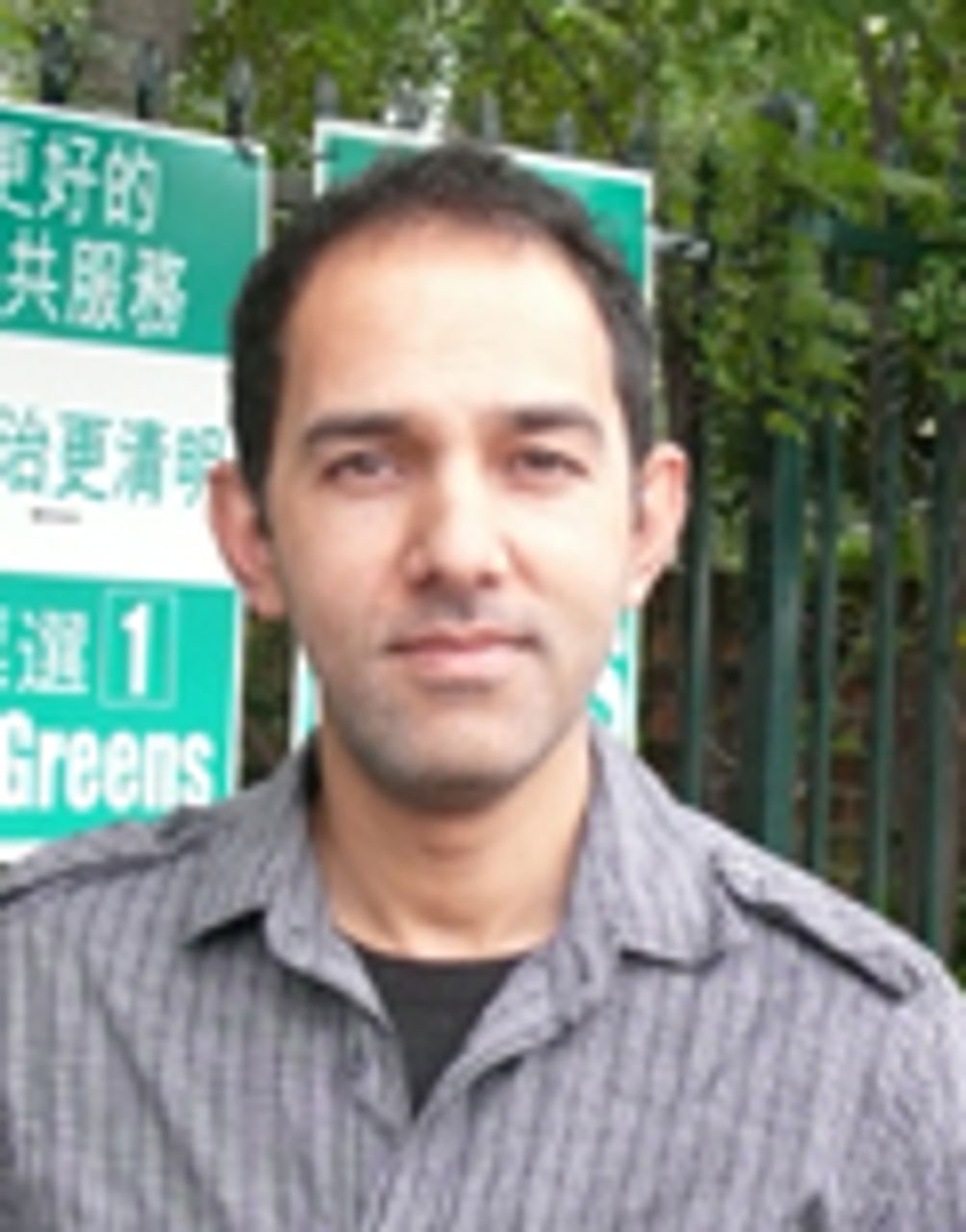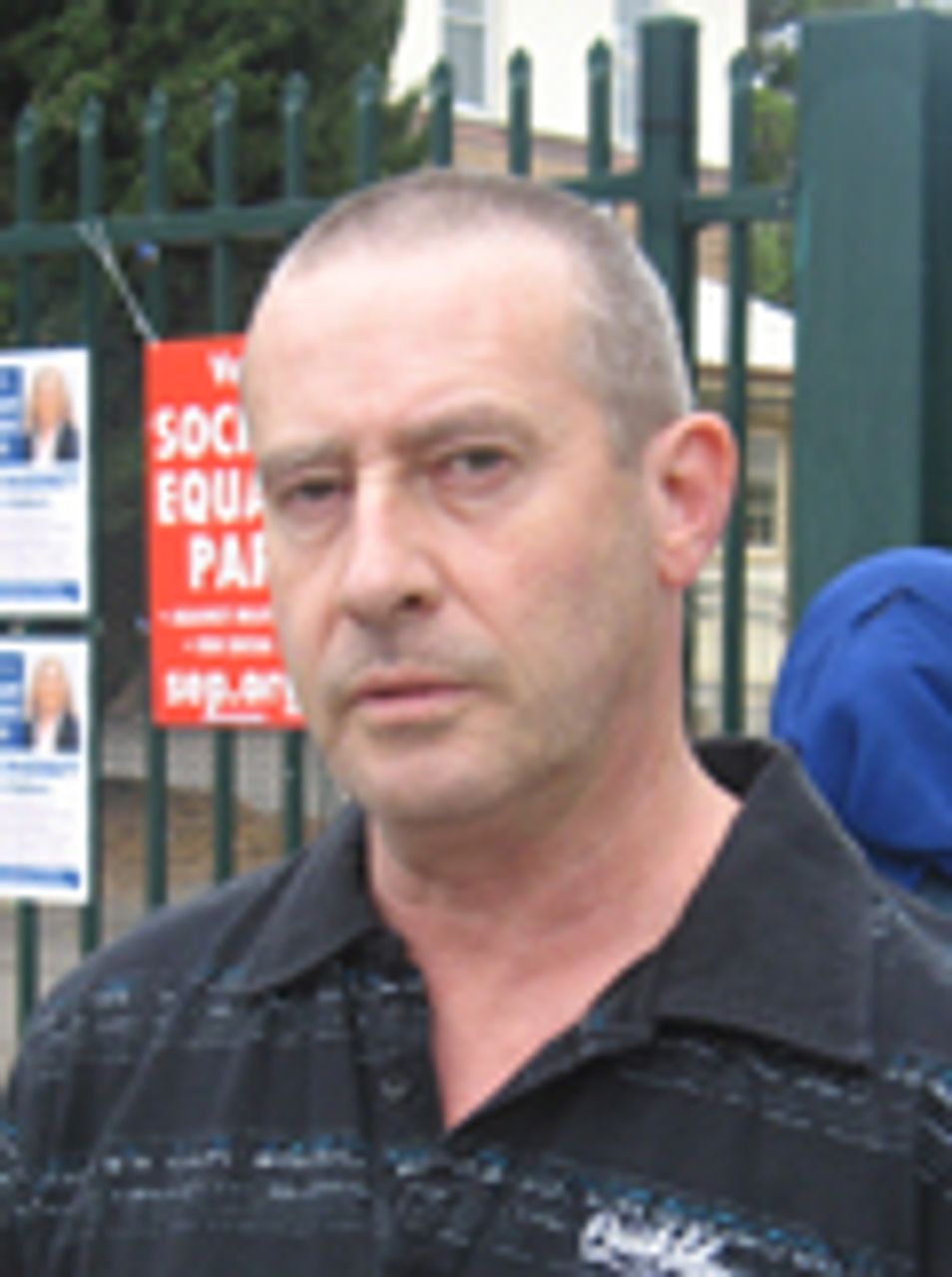A wide range of voters spoke to World Socialist Web Site reporters outside polling booths in the electorates of Auburn, Bankstown, Marrickville and Newcastle, where the Socialist Equality Party stood candidates on March 26. The overwhelming anger and distrust of Labor—state and federal—produced a landslide defeat of the New South Wales state government.
Below is the first of two articles exploring some of the reasons why hundreds of thousands of ordinary people rejected any vote for Labor. This article focuses on attitudes to the parliamentary parties. The second article, to be posted tomorrow, will deal with voters’ concerns about the military assault on Libya, Labor’s attacks on living standards, public health and education, and other issues ignored by the parliamentary parties and the media during the three-week state election campaign.
 Neil McPherson
Neil McPhersonMany voters were scathing in their condemnation of not only the Labor government, but the entire parliamentary setup. While there was a massive swing against Labor, this was largely a negative vote.
“I don’t have any great hope in these elections,” Neil MacPherson told WSWS reporters in Marrickville. “The [Labor] government is beneath contempt, but the opposition hasn’t really covered itself in glory in showing itself as an alternative. It’s really a choice of very few options. I voted for the Liberals not because I support their policies but because I’m utterly disgusted with the other party.”
 Jacob Nelson
Jacob NelsonTAFE student Jacob Nelson, also from Marrickville, expressed similar sentiments, even though he voted Labor, because his family had always done so. “I didn’t necessarily want to,” he said. “I don’t feel things will change and I don’t feel my vote necessarily matters.”
“It’s pretty cynical, I suppose,” Nelson continued, “but I can’t relate to what the politicians are trying to say or whether they represent me. There’s no difference between the major parties—on all major issues they sound the same, speak the same—they’re all parties of the banks and big businesses.”
Laurie-John Quillerat, an unemployed gardener, explained that he was “disappointed” with Labor’s evolution in recent years, both state and federal. “They’ve just become much more conservative and conformist, which isn’t good for a healthy democracy,” he said. Like countless other voters who spoke with the WSWS, Quillerat declared: “Labor is definitely not a workers’ party anymore.”
 Bruce
BruceBruce, a high school teacher from Newcastle, directed his fire against all the parliamentary parties, which, he said, “didn’t care about ordinary people.” He continued: “Their policies are deceptive. They give the impression that they can make things better, but at the end of the day nothing changes or things get worse. Politicians think only of themselves. This voting process we are going through here today is a waste of time and money.”
Hana, from Bankstown, raised last year’s political coup carried out by the federal Labor leadership, at the behest of the mining companies and the US embassy, which replaced Kevin Rudd with Julia Gillard as prime minister.
While Hana did not fully understand these machinations, she instinctively recognised the anti-democratic character of the coup. “I can’t stand Julia Gillard for what she did to Kevin Rudd. I cried when they removed him from office because it wasn’t right. One minute you’re the prime minister and then the next you’re not. It was the people who voted for him and not the [Labor] caucus.”
Rudd’s proposed super profits tax on the mining companies, she said, was “a good thing. The mining companies can afford to pay more taxes, but that’s why they got rid of him.”
Ahmeid Sleiman, a 30-year-old construction worker from Bankstown, decided to vote Liberal for the first time. “I want a change because it’s been all fake promises from Labor,” he said. His concerns also went beyond the NSW state government.
“I’ve been in construction for about seven years and the unions pretty much got everyone to vote Labor [in the 2007 federal election],” Sleiman said. “Nothing changed, when Labor came in,” he said. “Our conditions are no better than what they were under [the previous conservative prime minister] Howard. I’m completely lost about what we face in the future,” he admitted, “but something has got a change.”
Denise Peacock, a former printing industry worker, was injured at work and has been on workers’ compensation for several months. She feared being dismissed, despite working for the company for 15 years, and being forced onto welfare benefits.
Peacock said she had voted Liberal for the first time. “I feel very confused and I don’t really know what to do.” Asked why she had voted Liberal, she said: “I just think maybe they can do a better job”. She had not read any of the Liberals’ policies, but thought “it can’t go any worse”.
“I think we’re in a mess,” she emphasised. “It’s all just about the rich getting richer and the poor getting poorer. Nobody does anything about it. People are working seven days a week just to survive. Who is going to fix it?”
Few of those who voted for the Greens had examined their policies. Most simply saw a Green vote as a means of making a protest against Labor and Liberal.
Mohammed, from Bankstown, said he had voted Labor since immigrating to Australia from Lebanon. He was critical of the Greens, even though he had reluctantly decided to vote for them. “In the last election I voted for the Greens because I didn’t like Labor. I thought we should give them a chance and I voted for Greens again this time but I do not really know why.
“The Greens are now in coalition with Labor and must share responsibility for any legislation passed by the government. If the Greens keep doing what they’re doing, I will be voting for the Socialist Equality Party next time.”
Those who voted for so-called independents often had little idea what they stood for.
 Ali
AliAli, from Pakistan, who voted for an independent candidate in Bankstown, said: “I’ve always voted Labor but this time I’ve decided to support an independent. Maybe she is going with Labor anyway—I don’t really know—but I didn’t want to vote for the Greens because they just turn around and go back to Labor.”
Some people voted informal—deliberately leaving their ballots blank or spoiling them, in disgust. Several expressed a politically unfocussed contempt for the entire parliamentary process.
 Farid
FaridFarid, a University of New South Wales student, said: “None of the parties, or independents, actually had policies which covered the relevant issues. Their whole demeanor, and their advertising on TV, simply bad-mouthed each other. I wouldn’t want to support that. They weren’t really for me. They represent the bigger companies and corporations.”
Several workers related Labor’s increasingly right-wing trajectory to their experiences under the Hawke and Keating federal Labor governments from 1983 to 1996, which saw a vast free-market restructuring of society, an agenda that the current Gillard government has pledged to renew.
Unger, originally from German and a long-time meat worker in his late fifties, said: “The Labor Party is not for the worker and they haven’t been for years. You have to go back to Bob Hawke. He was the head of the ACTU [Australian Council of Trade Unions] but as soon as he got into government the first thing he did was hammer the unions. He started off with the pilots and then went after the others.”
 Brian
BrianBrian, who works at a state-owned corporation, told the WSWS in Auburn: “I don’t think Labor has represented anybody’s interests since Gough Whitlam in 1972. I think that was the true Labor Party but see how long he lasted? I don’t see a great deal of difference between Liberal and Labor. Look at Labor’s land development policies—Labor just rubberstamps whatever the developers want. It’s an absolute joke.”
Abdul, 55, originally from Georgia and a welder, said he voted for the Socialist Equality Party. “I decided to stop voting Labor during the Hawke-Keating Labor governments. Things got very bad for workers during that time—unemployment went up, the unions did nothing and the government refused to listen to the problems of young problem. That’s when I started voting for socialists,” he said.
 Paula
PaulaPaula, who lives in a housing commission flat for aged pensioners, also voted for the SEP. “I don’t think politicians tell the truth,” she said. “They don’t come across as being genuine and they definitely do not represent ordinary working people.”
“I didn’t know who to vote for when I came here today. I was going to put in a blank ballot until I met the SEP candidate Noel Holt. The political parties will not change and I like the idea of a new party for working people. Workers can build this party if they want to. It’s the whole system that has to go and “the little people” put in charge. I think that is the only way we can make things better and end inequality,” she said.
 Monica
MonicaMonica, from the University of Western Sydney, was another who decided to vote for the SEP. “We need money for hospitals and education,” she said. “This is what your party stands for and I agree with that. The money in society is not being evenly distributed. People like Bill Gates have billions and yet there are people starving in Africa and other countries.
“We do need change and equality; society’s wealth is not being fairly distributed. They are helping the big corporations with a lot of money but little people have no say,” she said.
To be continued
The authors also recommend:
Vote for a socialist perspective in the New South Wales election
[25 March 2011]
